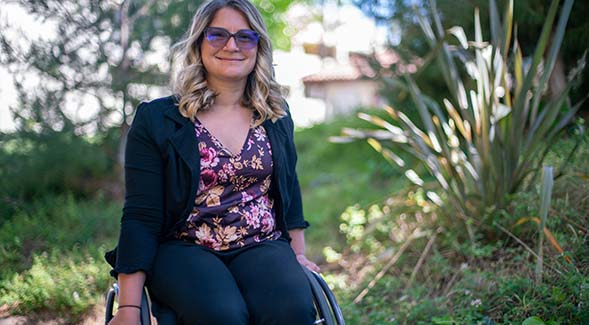Toni Saia Inducted into Disability Mentoring Hall of Fame
ARPE assistant professor is a passionate advocate for understanding disability as identity, culture.

Toni Saia has recognized from an early age that she mingles in a world that was not built with her in mind. A proud disabled woman and wheelchair user, she’s fought most of her life to break down environmental barriers placed in her path. There has been no shortage of them.
“Very early on, I knew my advocacy skills had to be top notch,” Saia recalls. “When I was 5 or 6 in public school, I was told, 'Children like you play on this side of the school yard.’ There was a line on the ground. I remember going home and saying, ‘Mom, I'm not playing behind that line.’”
With her family’s support, she got the line removed.
Today, Saia brings the same righteous energy as a disabled advocate, activist and mentor to the San Diego State University College of Education, where she’s in her first year as an assistant professor in SDSU’s nationally recognized rehabilitation counseling program.
Her mentorship within the disability community recently gained national recognition. Last month, Saia was inducted into the Susan M. Daniels Disability Mentoring Hall of Fame. Presented since 2015 by the National Disability Mentoring Coalition, the honor is named for the trailblazing disability champion and federal policymaker.
“It's great to have recognition within your own community,” Saia said. “I think so often disabled people have been siloed — we’ve been on the outside looking in. It's really amazing to have disabled leaders and mentors being highlighted for the good work that we do.”
Mentorship made a significant impact on Saia’s life. As an undergraduate at the University of Arizona, she flourished under the guidance of Sue Kroeger and Amanda Kraus, who both held the position of executive director for disability resources. Saia worked closely with Kraus to develop U of A’s Disability Cultural Center.
Classroom model
In her own academic career, Saia has been intentional about involving disabled students in her teaching and research.
“I'm always seeking out disabled mentees,” she said. “I tell them things that might seem simple, like, ‘You can lead,’ or ‘You can do this.’ But for our community, we need to hear that.”
A main focus of Saia’s work has been to shift the understanding of disability from being a diagnosis, to being an identity, community and culture — one worth celebrating and being proud of.
It’s a community she didn’t fully connect with until college and later through her activism with the disability rights organization American Disabled for Attendant Programs Today (ADAPT). “It was one of the only times in my life where I could be unapologetically myself,” she said.
It’s an important perspective that she brings to her field, where she trains future rehabilitation counselors who will soon be working to connect disabled people with employment opportunities and empower them to lead fulfilling lives. Saia says only a small fraction of rehabilitation counselors are themselves “out” as disabled people.
“Just my presence coming in as a wheelchair user is really important for the students,” Saia said. “I bridge the gap between what the textbook says and lived experience. Societally, we still pit disability as a negative thing, but disability is a natural part of life and it can also be an identity. I think I allow students to explore that.”
Saia diligently engrains accessibility in all her courses, understanding that inaccessible design sends a clear message that certain people are not welcome and valued. She is also a staunch advocate for the social model of disability, which holds people are disabled by environmental barriers — both physical and attitudinal — rather than their impairments.
To help address the attitudinal piece, she recently created a learning module on identity-first language. In it, she recommends the use of “disability” over more euphemistic terms and “disabled people” over person-first language that she argues perpetuates stigmas.
She adds that much more needs to be done.
“I think in higher education we're getting better at including disability in diversity initiatives, but it's still very much an afterthought,” she said. “That's kind of interesting given that disability can intersect with other identities and cultures. It doesn't really make sense.”
She says allies are needed to join the fight.
“I want to bridge the gap between awareness and action,” she said. “We have to look at the systems, and we're a part of it. I want us in higher ed to push beyond compliance — to think about who is not at the table and why, and what happens when they get to the table.”



